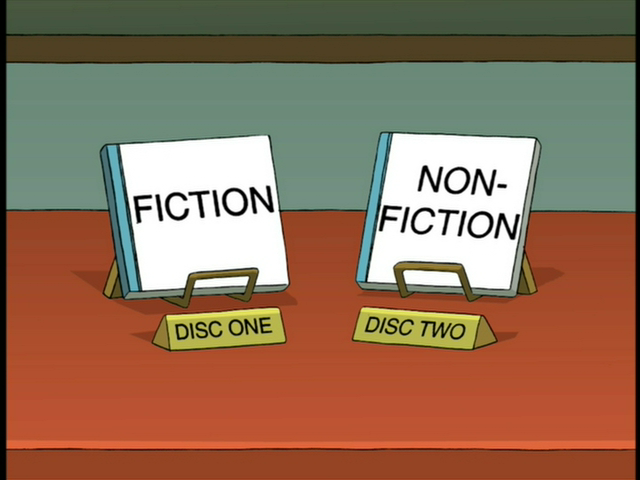
Why I’m Cheating on Fiction
This is a guest post from Swapna Krishna. Swapna is a freelance editor and chronic bibliophile. When she’s not working, reading, or off on some exotic adventure, she’s probably wandering around her Capitol Hill neighborhood in Washington, DC, with a craft beer in hand. You can find her book reviews at S. Krishna’s Books and her incessant ramblings on Twitter at @skrishna.
_________________________
Fiction will always be my first love. There’s something about settling down with a book and it transporting you completely, whether down the street, to a different continent, or to another world entirely. Fiction is transforming; it can change the way you look at the world, helping you to see things through foreign eyes. It’s also relaxing. After a busy day, settling into an effortless book is one of the best ways to unwind. I love fiction.
But I have a confession.
I’ve been reading more and more nonfiction over the past year. I’ll always read more fiction that nonfiction, simply because it’s easier and faster, but I’ve discovered that it’s nonfiction that has been calling my name, whispering to me from the shelves and shelves of unread books I own. It’s nonfiction that I’m more excited to pick up and am looking forward to. Most of my favorite reads of 2013 were, in fact, nonfiction.
Why, though? I’ve been trying to figure out the answer to this question for a long time, and I think I have it. I read for entertainment, yes, but I also love to learn through what I read. I enjoy picking up a fun fact (trivia is my middle name!) or finding out something new about the world. And fiction’s a great a way to do that; interesting new subject matter combined with stellar storytelling makes for a great way to spend time. But these days, I’ve changed. Or rather what I’ve read has changed me. Because I want MORE. My thirst to learn new things is no longer fully sated by fiction. I’m tired of wondering what’s true and what’s not; I just want to know. Hello, nonfiction.
For example, one of my favorite things to read about is British royal history; oh Philippa Gregory, I have read ALL your books. And I’ll probably still do that, but I’ve generally cut down a lot on the historical fiction I read. At the end of the day, I’d rather just pick up a history.
A lot of people are intimidated or turned off by nonfiction, but trust me, it doesn’t all have to be boring and scholarly. So if you’re intrigued by my grandiose statements about the magic of nonfiction, I have (of course) some recommendations of books you can try. Nonfiction doesn’t have to be slow and blah. Trust me; the most interesting stories are the ones that are true.

Five Days at Memorial is a book that blew my mind and changed my world. I never truly understood the institutional failures after Hurricane Katrina, how the government we depend on failed us spectacularly. This book brought that front and center.
It’s set at Memorial Medical Center in New Orleans, and is a day-by-day chronicle (told in narrative form) of what happened for the five days around the storm. Post Katrina and its aftermath, doctors were accused of murdering patients; what desperation led to such horrific events? How were these decisions made? It shows the total and complete breakdown of everything in the face of such overwhelming chaos. After reading it, I understood not only more about US history and the true disillusionment that people had after Katrina, but also I was more aware of myself and how I make decisions under (not even comparable) stress.
Also: it reads like fiction. Trust me. You’ll think you’re reading a gripping novel that’s impossible to put down.

Yes, this is that book. The one where the author went on Fox News and was subjected to “…but you’re a MUSLIM. How can you write a book about JESUS?” and we all laughed and cried at the same time.
Seriously, though, this book is good. There’s a lot of scholarship about there about the “real” Jesus and the difference between the historical record and the Bible. I’ve read a good amount of it (at least, as much as I can understand without being any sort of religious scholar); it’s fascinating. But what it’s often not is easy to read. Aslan takes these arguments and thoughts and distills them down into something that’s accessible and short—without notes, the book runs just 200 pages.
The book does have some issues—overly simplistic arguments and some logic holes—but it’s a great example of how history doesn’t have to be boring.

Yes, the title is long. But this book. Oh, this book. If you’ve ever been a bully, or been bullied, or just wondered WHY the bullying culture has become such a thing, then you have to read this book. And I’m not just talking about that one time in middle school; it happen on Twitter and Goodreads among adults every day. Why do people feel the need to gang up on one another? What is it about being a bully that is so attractive? And what makes some people more likely to be the victim of bullying, rather than a bully themselves?
Bazelon asks tough questions. And she doesn’t have any easy answers. But she reframes the debate and makes you think. While her focus is, indeed, the high school environment, this is a book I think anyone who’s active on social media should take the time to read. You may not agree with everything she says, but you’ll definitely have something to say yourself.
These books are great places to start; they’re all engaging and never devolve into dry commentary. But there are so many others out there; what are some books that you recommend when dipping your toes in nonfiction?











